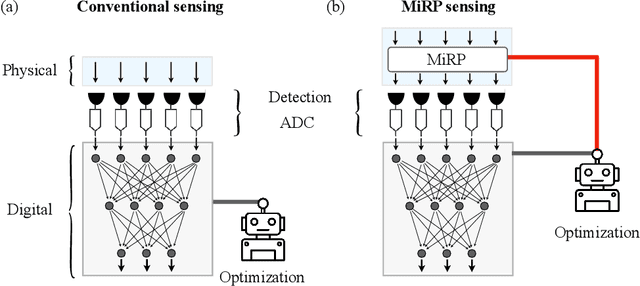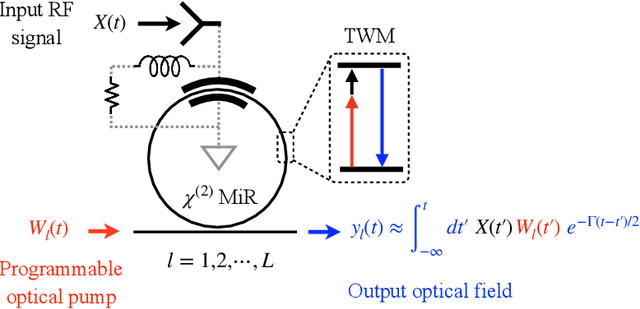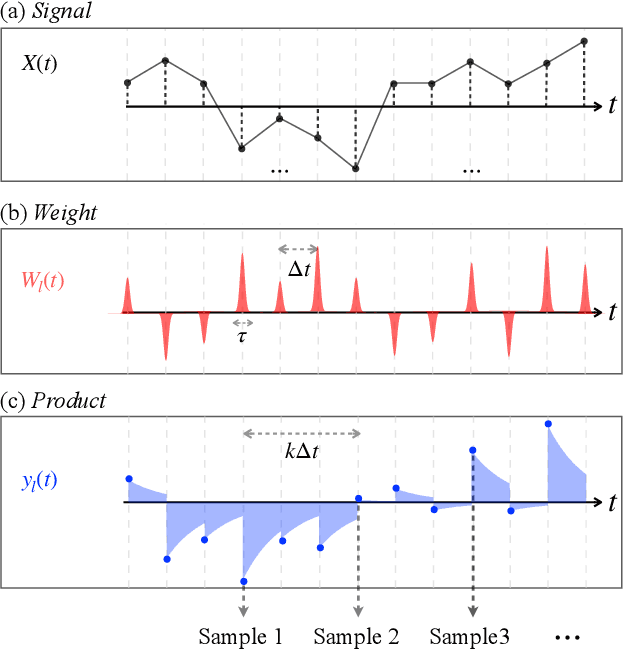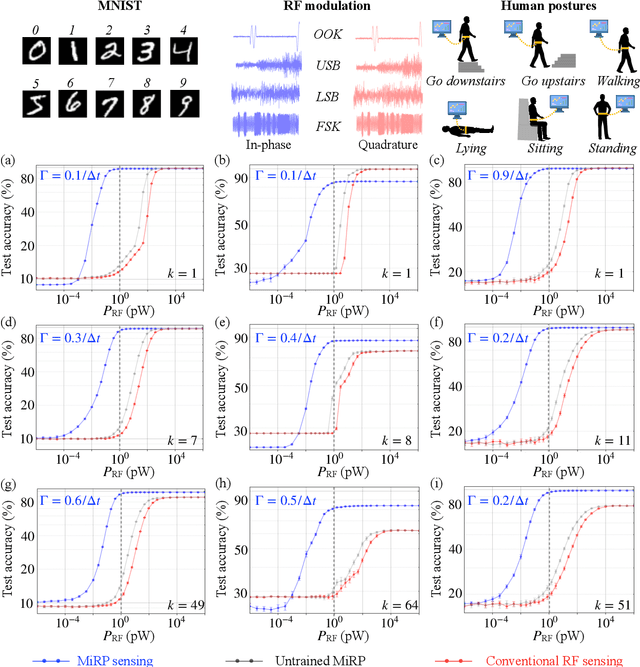Sri Krishna Vadlamani
Machine Intelligence on Wireless Edge Networks
Jun 13, 2025Abstract:Deep neural network (DNN) inference on power-constrained edge devices is bottlenecked by costly weight storage and data movement. We introduce MIWEN, a radio-frequency (RF) analog architecture that ``disaggregates'' memory by streaming weights wirelessly and performing classification in the analog front end of standard transceivers. By encoding weights and activations onto RF carriers and using native mixers as computation units, MIWEN eliminates local weight memory and the overhead of analog-to-digital and digital-to-analog conversion. We derive the effective number of bits of radio-frequency analog computation under thermal noise, quantify the energy--precision trade-off, and demonstrate digital-comparable MNIST accuracy at orders-of-magnitude lower energy, unlocking real-time inference on low-power, memory-free edge devices.
Disaggregated Deep Learning via In-Physics Computing at Radio Frequency
Apr 24, 2025Abstract:Modern edge devices, such as cameras, drones, and Internet-of-Things nodes, rely on deep learning to enable a wide range of intelligent applications, including object recognition, environment perception, and autonomous navigation. However, deploying deep learning models directly on the often resource-constrained edge devices demands significant memory footprints and computational power for real-time inference using traditional digital computing architectures. In this paper, we present WISE, a novel computing architecture for wireless edge networks designed to overcome energy constraints in deep learning inference. WISE achieves this goal through two key innovations: disaggregated model access via wireless broadcasting and in-physics computation of general complex-valued matrix-vector multiplications directly at radio frequency. Using a software-defined radio platform with wirelessly broadcast model weights over the air, we demonstrate that WISE achieves 95.7% image classification accuracy with ultra-low operation power of 6.0 fJ/MAC per client, corresponding to a computation efficiency of 165.8 TOPS/W. This approach enables energy-efficient deep learning inference on wirelessly connected edge devices, achieving more than two orders of magnitude improvement in efficiency compared to traditional digital computing.
Micro-Ring Perceptron Sensor for High-Speed, Low-Power Radio-Frequency Signal
Apr 19, 2025



Abstract:Radio-frequency (RF) sensing enables long-range, high-resolution detection for applications such as radar and wireless communication. RF photonic sensing mitigates the bandwidth limitations and high transmission losses of electronic systems by transducing the detected RF signals into broadband optical carriers. However, these sensing systems remain limited by detector noise and Nyquist rate sampling with analog-to-digital converters, particularly under low-power and high-data rate conditions. To overcome these limitations, we introduce the micro-ring perceptron (MiRP) sensor, a physics-inspired AI framework that integrates the micro-ring (MiR) dynamics-based analog processor with a machine-learning-driven digital backend. By embedding the nonlinear optical dynamics of MiRs into an end-to-end architecture, MiRP sensing maps the input signal into a learned feature space for the subsequent digital neural network. The trick is to encode the entire temporal structure of the incoming signal into each output sample in order to enable effectively sub-Nyquist sampling without loss of task-relevant information. Evaluations of three target classification datasets demonstrate the performance advantages of MiRP sensing. For example, on MNIST, MiRP detection achieves $94\pm0.1$\% accuracy at $1/49$ the Nyquist rate at the input RF signal of $1$~ pW, compared to $11\pm0.4$\% for the conventional RF detection method. Thus, our sensor framework provides a robust and efficient solution for the detection of low-power and high-speed signals in real-world sensing applications.
Improved Differential Evolution based Feature Selection through Quantum, Chaos, and Lasso
Aug 20, 2024Abstract:Modern deep learning continues to achieve outstanding performance on an astounding variety of high-dimensional tasks. In practice, this is obtained by fitting deep neural models to all the input data with minimal feature engineering, thus sacrificing interpretability in many cases. However, in applications such as medicine, where interpretability is crucial, feature subset selection becomes an important problem. Metaheuristics such as Binary Differential Evolution are a popular approach to feature selection, and the research literature continues to introduce novel ideas, drawn from quantum computing and chaos theory, for instance, to improve them. In this paper, we demonstrate that introducing chaos-generated variables, generated from considerations of the Lyapunov time, in place of random variables in quantum-inspired metaheuristics significantly improves their performance on high-dimensional medical classification tasks and outperforms other approaches. We show that this chaos-induced improvement is a general phenomenon by demonstrating it for multiple varieties of underlying quantum-inspired metaheuristics. Performance is further enhanced through Lasso-assisted feature pruning. At the implementation level, we vastly speed up our algorithms through a scalable island-based computing cluster parallelization technique.
Quantum-secure multiparty deep learning
Aug 10, 2024Abstract:Secure multiparty computation enables the joint evaluation of multivariate functions across distributed users while ensuring the privacy of their local inputs. This field has become increasingly urgent due to the exploding demand for computationally intensive deep learning inference. These computations are typically offloaded to cloud computing servers, leading to vulnerabilities that can compromise the security of the clients' data. To solve this problem, we introduce a linear algebra engine that leverages the quantum nature of light for information-theoretically secure multiparty computation using only conventional telecommunication components. We apply this linear algebra engine to deep learning and derive rigorous upper bounds on the information leakage of both the deep neural network weights and the client's data via the Holevo and the Cram\'er-Rao bounds, respectively. Applied to the MNIST classification task, we obtain test accuracies exceeding $96\%$ while leaking less than $0.1$ bits per weight symbol and $0.01$ bits per data symbol. This weight leakage is an order of magnitude below the minimum bit precision required for accurate deep learning using state-of-the-art quantization techniques. Our work lays the foundation for practical quantum-secure computation and unlocks secure cloud deep learning as a field.
 Add to Chrome
Add to Chrome Add to Firefox
Add to Firefox Add to Edge
Add to Edge